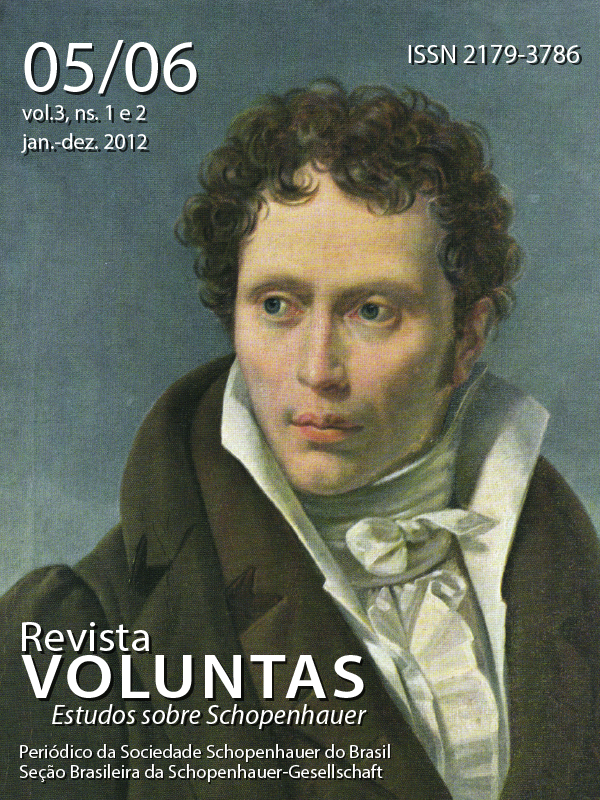On the problem of moral freedom in Hume and Schopenhauer
DOI:
https://doi.org/10.5902/2179378634040Keywords:
Freedom, Will, CharacterAbstract
In this work, we want to create a relation between Hume’s and Schopenhauer’s doctrines about the question of moral freedom. Our objective is to highlight their similarities, as well their differences. We show that in both cases, freedom appears as a general problem which includes more specific problems, especially the definition of the notions of will and character, and, formerly, both philosophers assume a position that can be equally considered as determinist. However, afterwards they pretend to overcome the determinism, and at this point their differences begin to appear. Their suggestions of overcoming of the determinism are equally shown through this article, and, at the end, we conclude that only Schopenhauer could shown a coherent solution as he associates individual human will with the notions of intelligible, empirical and acquired characterDownloads
References
BRASIL. Decreto-lei n. 2.848, de 7 de dezembro de 1940. Código Penal. Vade Mecum universitário RT. 3. ed. São Paulo: Editora Revista dos Tribunais, 2011.
COSTA, Claudio. Como ser um bom compatibilista. Princípios, v. 7, n. 8. Natal, 2000.
HUME, David. Investigação acerca do entendimento humano. Tradução de Anoar Aiex. São Paulo: Nova Cultural, 2004.
HUME, DAVID. Tratado da natureza humana. Tradução de Déborah Danowski. 2. ed. revista e ampliada. São
Paulo: UNESP, 2009.
JACQUETTE, Dave. The philosophy of Schopenhauer. Chesham: Acumen, 2005.
JANAWAY, Christopher. Schopenhauer’s philosophy of value. In: Better consciousness: Schopenhauer’s philosophy of value. Edited by Alex Neill and Christopher Janaway. Oxford: Wiley-Blackwell, 2009.
KANT, Immanuel. Grundlegung zur Metaphysik der Sitten. Werke in sechs Bänden. Band IV. Ed. de Wilhelm Weischedel. Wiesbaden: Insel, 1956.
KANT, IMMANUEL. Crítica da razão pura. Tradução de Valerio Rohden e Udo Baldur Moosburger. São Paulo:
Nova Cultural, 1999.
KOSSLER, Matthias. Life is but a mirror: on the connection between ethics, metaphysics and character in Schopenhauer. In: Better consciousness: Schopenhauer’s philosophy of value. Edited by Alex Neill and Christopher Janaway. Oxford: Wiley-Blackwell, 2009.
MAGEE, Brian. The philosophy of Schopenhauer. Revised and enlarged edition. New York: Oxford
University Press, 2009.
PAVÃO, Aguinaldo. O mal moral em Kant. Curitiba: CRV, 2011.
SCHOPENHAUER, Arthur. Die Welt Als Wille und Vorstellung, II. Ed. de Arthur Hübscher. Zürich:
Diogenes, 1977.
SCHOPENHAUER, ARTHUR. O mundo como vontade e como representação. Tradução, apresentação, notas e índices de Jair Barboza. São Paulo: Editora UNESP, 2005.
SCHOPENHAUER, ARTHUR. Parerga und Paralipomena. Zweiter Band. Ed. de Arthur Hübscher. Zürich: Diogenes, 1977.
SCHOPENHAUER, ARTHUR. Sobre o fundamento da moral. Tradução de Maria Lúcia Mello Oliveira Cacciola. 2. ed. São Paulo: Martins Fontes, 2001.
SCHOPENHAUER, ARTHUR. Über die Freiheit des menschlichen Willens. Ed. de Arthur Hübscher. Zurique: Diogenes, 1977.
SCHOPENHAUER, ARTHUR. Über die vierfache Wurzel des Satzes von zureichenden Grund. Ed. de Arthur Hübscher. Zürich: Diogenes, 1977.
ZAFFARONI, Eugenio Raul. PIERANGELI, José Hnrique. Manual de direito penal brasileiro, v.1,
parte geral. 7. ed. revisada e atualizada. São Paulo: Editora Revista dos Tribunais, 2007.
Downloads
Published
How to Cite
Issue
Section
License
The submission of original manuscripts to this journal implies the transference, by the authors, of the copyrights for printed and digital publication. The copyrights of a published manuscript belong ultimately to the author, and only the copyright for its first publication is reserved to the journal. Authors may only use the same results in other publications explicitly indicating this journal as the medium of the original publication.
Licence
Attribution-NonCommercial-ShareAlike 4.0 International (CC BY-NC-SA 4.0) - This license lets others remix, tweak, and build upon your work non-commercially, as long as they credit you and license their new creations under the identical terms.






